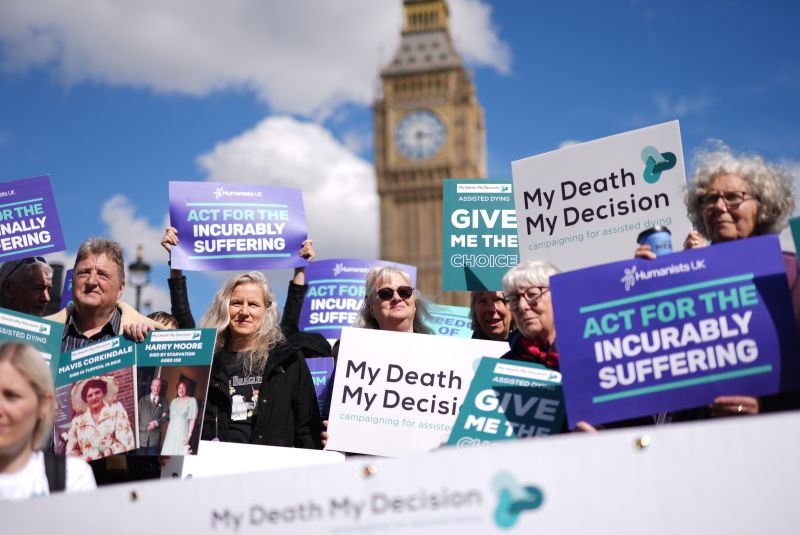Britain set for vote on assisted dying, after emotional debate that has divided lawmakers
November 29, 2024
British lawmakers are set to decide Friday whether to legalize assisted dying, a contentious proposal that would make the United Kingdom one of a small handful of nations to allow terminally ill people to end their lives.
An emotive debate Friday in Westminster is expected to last several hours, before a vote later in the day.
If passed, the bill will let people with a terminal condition and fewer than six months to live take a substance to end their lives as long as they are capable of making the decision themselves. Two doctors, followed by a High Court judge, would need to sign off on the choice.
The legislation would see Britain join a small collection of countries to push forward with the process. Canada, New Zealand, Spain and most of Australia allow assisted dying in some form, as do US states Oregon, Washington and California.
The vote is the culmination of a lengthy and occasionally painful debate in the country, which has seen high-profile figures dealing with terminal diagnoses become standard-bearers for the cause.
But it has sharply divided lawmakers, many of whom have labored to choose a side during an unusually strained week in Westminster, and the results of the vote appeared to be on a knife-edge. Members of Parliament have been given a free vote on the issue, meaning they can support either side according to their conscience, with no political ramifications.
In an open letter to MPs ahead of the vote, Esther Rantzen, a BBC TV presenter with advanced lung cancer who has become a prominent supporter of assisted dying, wrote: “Under our current criminal law the only choice for most people who are terminally ill, if they are facing an agonising death, is between suffering, Switzerland or suicide.” Rantzen has previously said she is herself considering using the Swiss assisted dying clinic Dignitas to end her life.
She urged MPs on all sides to vote on the issue. “This will probably not come before Parliament as an issue to debate for another decade,” she wrote. “How many more will be forced to suffer until then?”
But opponents have cited a variety of concerns with the bill, including their religious views, the strength of its safeguards, or the lack of time to consider its fineprint.
‘Parliament is tearing itself in two’
It is rare that British lawmakers are asked to decide for themselves on such an intimate issue, and many have struggled this week over how they will vote.
MPs will likely debate the issue for several hours. The vote, expected to immediately follow the debate, represents the major hurdle that the bill would need to pass to become law, though it would still be reviewed in the House of Lords and by a parliamentary committee.
Friday’s ballot in the House of Commons bears similarities to previous free votes concerning abortion and same-sex marriage. The prime minister, Keir Starmer, is expected to vote himself, but he hasn’t said which side he will support, insisting he wouldn’t want to influence lawmakers in either direction.
Proponents of the bill say assisted dying can bring dignity to terminal patients at the end of their lives, averting months of suffering and physical decline, and easing pressure on the country’s palliative, or end-of-life, services. Polling indicates that a comfortable majority of the public supports assisted dying.
In her open letter, Rantzen wrote: “The tragic truth is that no matter how excellent the palliative care is, it cannot prevent some kinds of suffering, fecal vomiting for example, or suffocating to death, or deep-rooted agony.”
But critics fear the bill’s guardrails are not stringent enough, and suggest patients could feel pressured to opt for an assisted death only to avoid becoming a burden on their families. Others have concerns that the bill has been sprung on MPs – hundreds of whom are in their first few months in the job following July’s election – without a thorough impact assessment or time to consider the proposal.
“I really believe that Labour got elected because the NHS is such a mess. … We’ve got to sort the NHS out before we go down this route,” she said. “Pressing ahead now is ignoring the imperative we’ve got to address the woefully underfunded palliative system.”
The proposed bill is broadly in line with the Oregon model, and does not go as far as Switzerland, the Netherlands and Canada, which allow assisted death in cases of suffering, not just for terminally ill people. It differs from euthanasia, the process in which another person deliberately ends someone’s life to relieve suffering.
It is currently a crime to help somebody die in England and Wales, punishable by up to 14 years in prison. Performing euthanasia on a person, meanwhile, is considered murder or manslaughter.









